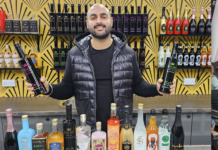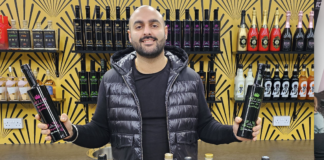In advance of this month’s Women in Wholesale conference, Helena Drakakis looks at what progress has been made towards diversity.
9%
Estimated number of senior management and executive positions in the top 30 UK wholesale companies that are occupied by women.
It took Vaseva Qarau three years to work her way up from receptionist to sales office manager at London wholesaler Wanis. She believes it wouldn’t have happened had she not attracted the attention of co-owner Sanjay Wadhwani: “I introduced myself to him,” Qarau recalls. “A month later, he approached me and suggested I become a sales rep. He sent me out with a colleague and a van loaded with lager and said, ‘Sell it.’ I sold five cases to five different clients. Without his initial support, I would not have progressed.”
It took Vaseva Qarau three years to work her way up from receptionist to sales office manager at London wholesaler Wanis. She believes it wouldn’t have happened had she not attracted the attention of co-owner Sanjay Wadhwani: “I introduced myself to him,” Qarau recalls. “A month later, he approached me and suggested I become a sales rep. He sent me out with a colleague and a van loaded with lager and said, ‘Sell it.’ I sold five cases to five different clients. Without his initial support, I would not have progressed.”
However, Qarau is still only one of nine women in a 150-strong company. While she describes her experience as “tough but positive”, she does not believe this is representative of the industry. “Wanis was lucky enough to have its female founder heading things up until 2007, but it’s a man’s world,” she says. “Women have to work extra hard to be noticed.”
All indicators point to wholesale being behind the curve in progressing women, with successes like Qarau’s often left to chance. No official figures are available, but rough estimates suggest that around 9% of senior management and executive positions in the top 30 wholesale companies are occupied by women, compared to 26% across the FTSE 100. And while gender imbalance is by no means unique to the industry, women want to see a shift.

One told Better Wholesaling on condition of anonymity: “Wholesale is traditional. It looks and feels man-biased. You can count the number of senior women on one hand. We’re all aware of the challenges, but would I say this openly? Absolutely not.”
However, the tide may be forced to change. As wholesale becomes increasingly hi-tech, broader skillsets will be required for companies to survive, paving the way for a more diverse workforce.
Is gender important?
Does gender really matter? In an ideal world, it wouldn’t, says Coral Rose, MD of the Country Range Group. “The most important thing should be how well you do your job,” she says. However, she recognises that groundwork must be done to attract, progress and retain women. “The industry was definitely more sexist when I joined, but there has been a shift away from this, which will make it more attracting about the lack of females – it’s about highlighting the opportunities for women to do better, exchanging ideas about ways the industry can adapt, showcasing women’s talents, building networks, and giving women confidence,” she says.
Measuring the talent pipeline
But it is perhaps ‘adaptation’ that wholesale may find difficult to unpick. The unconscious bias that occurs in any mono-cultural workplace, be it sex, age, ethnicity or otherwise, means internal examination could be pushed from the in-tray as other problems are prioritised. Worse still, diversity might not register as valuable further than an abstract idea or a box-ticking exercise.
A report by professional services firm Ernst & Young warned employers not to assume that gender parity looks after itself, citing the mantra ‘what gets measured gets managed’. ‘Few organisations have metrics to follow women as they move along their career to see where and why outstanding talent leaves the business or falls off the leadership track,’ the report states.
Case Study: Gender Parity in Government
Open the case study to find out how the Department of Business, Energy and Industrial Strategy of worked to increase gender parity.
Simon Hannah, MD of JW Filshill, supports driving the gender agenda forward, but doesn’t feel that his business puts up barriers or needs a formal strategy. In a small family business, he suggests, staff support doesn’t just focus on career but on personal lives, too.
“We have many women at Filshill who hold very senior positions and do an excellent job. They’re doing a great job because they’re committed to the company and passionate about what they do – not because of their gender,” Hannah says, adding that in his senior management team of seven, two are women, while three of the members of the company’s Works Council are female.
That said, Hannah doesn’t believe it’s job done. He was the first to sign up two of his female staff to the WiW conference, and he sees real value in schemes like the Scottish Wholesale Association’s mentoring programme, from which one of his senior female employees is currently benefiting.
Similarly, while acknowledging that “work needs to be done, especially at the highest level,” the Federation of Wholesale Distributors (FWD) chief executive James Bielby says a third of its training bursaries, designed to develop talent, have been awarded to women. Added to that, women received half of last year’s FWD gold medal awards. “Initiatives like these will ensure that the 47% of our members’ employees who are female have exactly the same opportunities to advance to senior positions as their male counterparts,” Bielby says.
This is encouraging, but WiW organiser Rowland highlights meaningful personal career development as being the key investment women crave as they move through the talent pipeline.

Creating meaningful change
Sam Simister, Innocent Drinks’ group supply chain director, shares that view, but admits that delivering meaningful change is “really tough”. A young company, Innocent is perhaps singular in having a 50-50 gender split, but managing youthful ambitions and the talent drain that can often start when women have a first child requires a desire to change at the top, transparency and creativity, she says.
The only woman on a board of eight, she has embarked on a new approach to career progression for her teams, which she calls the ‘career climbing wall’. Rather than seeing careers as vertical, appropriate roles that satisfy talent are identified and offered to parents or anyone requiring flexibility. Placements are made as a result of in-depth development conversations with line managers.
If you make a workplace attractive and support flexible working, people will give you 200%
Elit Rowland, organiser of the Women in Wholesale conference
Simister explains: “You can’t have an organisation where everyone wants to be promoted and you can’t have a organisation that swallows everyone’s desire to be flexible. But if you look at the climbing wall, the business is open to a movement of talent.”
Flexible hours and job shares among like-minded people are just some of the options she wrestles with daily. “It’s not perfect but you have to start somewhere,” she says.
One of Rowland’s clients, JJ Foodservice, has embraced her flexible working and measures her wholly on results. “Contrary to the established view, being a mum gives you fire and determination you never had.If you make a workplace attractive and support this, people will give 200%,” she says, adding that for employers to take a “leap of faith”, a person needs to have earned respect and trust.
However, Coral Rose says it’s also women’s responsibility to get better at asking for what they want: “Women need to step up to ensure they are considered for senior roles. Men are very good at selling themselves and women need to get better,” she notes.
Identifying an informal ‘sponsor’ early on was one way Simister took responsibility for her own career journey. She’s also an advocate of formal mentoring schemes, but warns they can take time to get going.
Back at Wanis, Qarau has taken it upon herself to spur on other talented women in the business: “I almost had to push one woman through the door so she could ask for a better position. When she asked, she got it. You have to encourage most women, build them up,” she says.
Qarau is now vying for a position on her company board. “I’ve grown a pair of balls and demanded something. I’ve said, ‘I’m worth this.’ I have had to work harder, push myself more and I’ve been lucky to have had 100% support from my manager,” she says. “I’ve demonstrated I’m good and I want to be taken seriously.”









